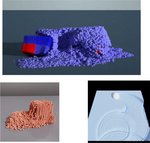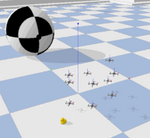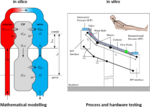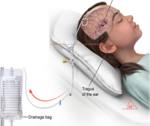Student Projects
Differential Particle Simulation for Robotics

This project focuses on applying differential particle-based simulation to address challenges in simulating real-world robotic tasks involving interactions with fluids, granular materials, and soft objects. Leveraging the differentiability of simulations, the project aims to enhance simulation accuracy with limited real-world data and explore learning robotic control using first-order gradient information.
Labels
Semester Project , Master Thesis
PLEASE LOG IN TO SEE DESCRIPTION
This project is set to limited visibility by its publisher. To see the project description you need to log in at SiROP. Please follow these instructions:
- Click link "Open this project..." below.
- Log in to SiROP using your university login or create an account to see the details.
If your affiliation is not created automatically, please follow these instructions: http://bit.ly/sirop-affiliate
More information
Open this project... call_made
Published since: 2025-03-10 , Earliest start: 2025-01-01 , Latest end: 2025-12-31
Applications limited to ETH Zurich , EPFL - Ecole Polytechnique Fédérale de Lausanne
Organization Robotic Systems Lab
Hosts Nan Fang , Ma Hao
Topics Engineering and Technology
Efficient Sampling-based GP-MPC for autonomous robots

Most control methods operate under the assumption of a known model. However, in practice, knowing the exact dynamics model a priori is unrealistic. A common approach is to model the unknown dynamics using Gaussian Processes (GPs) which can characterize uncertainty and formulate a Model Predictive Control (MPC) type problem. However, it is difficult to exactly utilize this uncertainty characterization in predictive control. In a recent approach [1], we proposed a sampling-based robust GP-MPC formulation for accurate uncertainty propagation by sampling continuous functions. In contrast, in the proposed project, you will implement an approximation method for sampling continuous functions using a finite number of basis functions [2] and solve the MPC problem jointly with the sampled dynamics. You will analyze the trade-offs between performance, approximation accuracy, and computational cost for this method.
Keywords
Gaussian Processes, model predictive control (MPC), Issac sim simulator, uncertainty propagation, Algorithms
Labels
Semester Project , Master Thesis
Description
See the attached pdf
Goal
See the attached pdf
Contact Details
If you are interested, please contact Manish Prajapat, Amon Lahr and Johannes Köhler {manishp, amlahr, jkoehle} @ethz.ch.
More information
Open this project... call_made
Published since: 2025-02-14 , Earliest start: 2025-02-16 , Latest end: 2025-10-31
Organization Research Zeilinger
Hosts Prajapat Manish
Topics Engineering and Technology
Vision-based Autonomous Racing with F1Tenth Car

In this semester thesis, our goal is to enable an F1Tenth car, an autonomous vehicle at 1:10 scale of a Formula 1 car, to race safely on a track that is perceived through RGB-D images captured by an onboard camera.
Keywords
vision-based control, autonomous racing, image processing
Labels
Semester Project
Description
In this semester thesis, our goal is to enable an F1Tenth car, an autonomous vehicle at 1:10 scale of a Formula 1 car, to race safely on a track that is perceived through RGB-D images captured by an onboard camera. The lane detection system must be lightweight to ensure real-time performance, as it provides a reference for the controller. Furthermore, the controller must ensure the car's safety on the track while effectively handling potential challenges caused by perception inaccuracies. The performance of the proposed method will be validated through hardware testing.
Goal
Our objective is to enable the F1Tenth car to autonomously race on an unknown racing track by perceiving the lane markings through an onboard camera. This thesis focuses primarily on the development of the control module that can be combined with the existing perception stack.
We aim to achieve this objective through the following tasks:
- Setting up the existing perception stack for centerline detection and potentially fine tuning it for the specific experiment setup
- Implementing the method that combines several consecutive centerline estimates into a road map
- Implementing a controller that uses the road map as a reference
- Testing the performance of the method on F1Tenth car
Qualifications:
- Experience with Python
- Experience with implementing model predictive control methods
- Basic knowledge of computer vision and image processing
- Interest in robotics and hardware applications
Contact Details
To apply for this semester thesis, please send your resume and transcript to Jelena Trisovic (tjelena@ethz.ch).
More information
Open this project... call_made
Published since: 2025-01-31 , Earliest start: 2025-01-15
Organization Research Zeilinger
Hosts Trisovic Jelena
Topics Engineering and Technology
Robust predictive control for safe and optimal control of nonlinear uncertain systems

This project aims to improve the design of predictive controllers that robustly ensure safe operation for a large class of uncertain nonlinear systems.
Keywords
Model predictive control, robust control, nonlinear systems, learning-based control
Labels
Master Thesis , ETH Zurich (ETHZ)
Contact Details
Dr. Johannes Köhler, jkoehle@ethz.ch
More information
Open this project... call_made
Published since: 2025-01-27
Organization Research Zeilinger
Hosts Köhler Johannes
Topics Mathematical Sciences
Hardware-in-the-Loop Testing of Cerebrospinal Fluid Shunt Systems for Hydrocephalus Patients

Hydrocephalus is a medical condition characterized by the disturbed dynamics of cerebrospinal fluid (CSF) and its excessive accumulation in the brain ventricles. In contemporary therapy, a shunt system is implanted that drains CSF from the ventricles into the peritoneal space. While various types of shunt systems exist, they are essentially all based on passive mechanical pressure valves that are driven by the external pressure gradient. This limits the efficacy of these shunts and complications such as over- and underdrainage may occur. To improve the therapy of hydrocephalus, we are working towards intelligent mechatronic shunt systems that are capable of monitoring vital signs and adapting CSF drainage according to the patient’s actual needs. In this project, you will support the technical upgrade of an existing hardware-in-the-loop test bench that is used for the evaluation of existing shunt systems and the development of smart shunt system.
Keywords
Estimation and Control, Mechatronic Systems
Labels
Student Assistant / HiWi
Contact Details
More information
Open this project... call_made
Published since: 2025-01-14 , Earliest start: 2025-01-15
Applications limited to ETH Zurich
Organization Research Zeilinger
Hosts Flürenbrock Fabian
Topics Mathematical Sciences , Engineering and Technology
Online Learning of Dynamic Control for Soft Manipulators

This project aims to develop an online learning framework for achieving precise position control of a soft robotic arm while adapting to time-varying system dynamics.
Keywords
online learning, distribution shift, soft robotics, position control
Labels
Master Thesis
Description
Soft robots offer notable advantages over rigid robots in terms of flexibility and compliance, which facilitate safe and robust interactions with environments. These characteristics make them ideal for diverse applications, such as medical contexts and bionic robotics. However, due to the absence of precise models and the time-varying nature of their system dynamics, achieving optimal control performance on soft robots remains a significant challenge. With the rapid development of machine learning, we now have various learning-based methods to achieve precise pose control of soft robots [4]. Nevertheless, in practice, we have found that the (off-line) well-trained control policies often become ineffective upon deployment due to time-varying system dynamics, which lead us to rethink the traditional “sampling-training-deployment” paradigm in machine learning.
The rise of online learning can effectively enable models to adapt to changing system dynamics. Recent studies have shown that in online learning, even when using an approximate (or even linear) model, it is possible to ensure a sublinear convergence of the regret [2]. Additionally, online learning demonstrates high learning efficiency and stability in both simulations and complex real-world systems.
In this project, we will adopt gradient-based stochastic online learning to achieve precise pose control of a soft manipulator [1,3]. The cable-driven soft robot arm comprises three independent modules (about 0.2m for each module), and each module is actuated independently with three cables. More details of the robot setup, such as structural and mechanical description, can be found in our previous work [3]. We will first establish an approximate model of the system, then learn both feedforward and feedback controllers in an online manner, which enable the soft arm to perform a series of acrobatic demonstrations. Finally, we will compare our approach with some existing offline control algorithms to evaluate the performance in terms of learning efficiency, handling distribution shifts, and tracking accuracy.
Reference
[1] Chen, Z., Guan, Q., Hughes, J., Menciassi, A. and Stefanini, C., 2024. S2C2A: A Flexible Task Space Planning and Control Strategy for Modular Soft Robot Arms. arXiv preprint arXiv:2410.03483.
[2] Ma, H., Zeilinger, M. and Muehlebach, M., 2024. Stochastic Online Optimization for Cyber-Physical and Robotic Systems. arXiv preprint arXiv:2404.05318.
[3] Guan, Q., Stella, F., Della Santina, C., Leng, J. and Hughes, J., 2023. Trimmed Helicoids: An Architectured Soft Structure yielding Soft Robots with High Precision, Large Workspace, and Compliant Interactions. npj Robotics, 1(1), p. 4.
[4] Bern, J.M., Schnider, Y., Banzet, P., Kumar, N. and Coros, S., 2020. Soft Robot Control with A Learned Differentiable Model. International Conference on Soft Robotics, pp. 417-423.
Goal
Work packages
Stage 1 - Preparation
- Literature review on state-of-the-art work learning-based methods for soft robotics
- Identify a rough (differentiable) model for the soft manipulator, e.g. system identification in the frequency domain, data-driven method
- Setup the motion capture system for tracking the posture of the soft manipulator
Stage 2 - Combine online learning & soft arm
- Implement iterative learning control (ILC) for the soft manipulator to track a single fixed given reference trajectory
- Implement stochastic online learning method for tracking any reference trajectories (in the workspace of the soft manipulator)
Stage 3 - Analysis & demonstrations
- Quantify the control performance, and compare to a baseline (e.g. an offline trained controller)
- Perform some acrobatics using the soft manipulator for demonstration
Contact Details
Qinghua Guan, qinghua.guan@epfl.ch, EPFL
Hao Ma, haomah@ethz.ch, ETHZ
Cheng Pan, cheng.pan@epfl.ch, EPFL
To apply, please include a short motivation for this project, as well as a copy of your CV and transcripts.
More information
Open this project... call_made
Published since: 2025-01-08 , Earliest start: 2024-11-07 , Latest end: 2025-08-01
Organization Research Zeilinger
Hosts Ma Hao
Topics Engineering and Technology
Digital Twin for Spot's Home

MOTIVATION ⇾ Creating a digital twin of the robot's environment is crucial for several reasons: 1. Simulate Different Robots: Test various robots in a virtual environment, saving time and resources. 2. Accurate Evaluation: Precisely assess robot interactions and performance. 3. Enhanced Flexibility: Easily modify scenarios to develop robust systems. 4. Cost Efficiency: Reduce costs by identifying issues in virtual simulations. 5. Scalability: Replicate multiple environments for comprehensive testing. PROPOSAL We propose to create a digital twin of our Semantic environment, designed in your preferred graphics Platform to be able to simulate Reinforcement Learning agents in the digital environment, to create a unified evaluation platform for robotic tasks.
Keywords
Digital Twin, Robotics
Labels
Semester Project , Master Thesis
Contact Details
Requirements: experience with a Python deep learning framework, understanding of 3D scene and camera geometry.
Please send us a CV and transcript.
Dr. Hermann Blum (blumh@ethz.ch) Dr. Zuria Bauer (zbauer@ethz.ch) Tifanny Portela (tportela@ethz.ch) Jelena Trisovic (tjelena@ethz.ch)
More information
Open this project... call_made
Published since: 2024-12-17 , Earliest start: 2025-01-05
Applications limited to University of Zurich , ETH Zurich , EPFL - Ecole Polytechnique Fédérale de Lausanne
Organization Computer Vision and Geometry Group
Hosts Blum Hermann , Portela Tifanny , Bauer Zuria, Dr. , Trisovic Jelena
Topics Information, Computing and Communication Sciences
Monitoring and prediction for neuro-intensive care

Delayed cerebral ischemia (DCI) occurs in up to one third of patients with treated aneurysmal subarachnoid hemorrhage. Due to the lack of a reliable biomarker in the clinic, timely detection of DCI is currently highly challenging. In fact, its onset is often missed despite the multimodal monitoring in intensive care, with severe consequences for the patient: Secondary infarctions may lead to severe disability or even death. This project aims at developing a novel bedside measurement system to monitor and predict the risk for DCI in the hospital, filling the current diagnostic gap.
Keywords
Biomedical engineering, clinical data analysis, system modeling, state estimation
Labels
Semester Project , Master Thesis
PLEASE LOG IN TO SEE DESCRIPTION
This project is set to limited visibility by its publisher. To see the project description you need to log in at SiROP. Please follow these instructions:
- Click link "Open this project..." below.
- Log in to SiROP using your university login or create an account to see the details.
If your affiliation is not created automatically, please follow these instructions: http://bit.ly/sirop-affiliate
More information
Open this project... call_made
Published since: 2024-12-03 , Earliest start: 2025-01-10 , Latest end: 2025-12-19
Organization Research Zeilinger
Hosts Heim Marco
Topics Engineering and Technology
Error bounds for scalable Gaussian process regression

The goal of the project consists in deriving error bounds for the approximate Gaussian process regression method given by the FITC method.
Keywords
Gaussian processes, uncertainty bounds
Labels
Semester Project , Master Thesis
Description
See attachment
Contact Details
Dr. Anna Scampicchio, ascampicc@ethz.ch
More information
Open this project... call_made
Published since: 2024-12-02
Organization Research Zeilinger
Hosts Scampicchio Anna
Topics Engineering and Technology
Error bounds for Regularized Trigonometric Regression in the Multi-task setting

Multi-task learning is the problem of jointly learning multiple functions that are “related” to each other. By leveraging this similarity, estimation performance can be improved on each (possibly unseen) task, and one can make an efficient use of the available data. The project aims at deriving uncertainty bounds around the multi-task-system estimates. Specifically, the candidate will work with the regularized trigonometric regression inspired by the so-called sparse-spectrum Gaussian process regression, investigate the issue of bias learning (i.e., finding the features that encode similarity among tasks) and derive error bounds for it, possibly setting the analysis in the statistical learning framework.
Keywords
statistical learning, multi-task learning, uncertainty bounds
Labels
Semester Project , Master Thesis
Description
see attachment
Goal
see attachment
Contact Details
Dr. Anna Scampicchio, ascampicc@ethz.ch
More information
Open this project... call_made
Published since: 2024-12-02
Organization Research Zeilinger
Hosts Scampicchio Anna
Topics Engineering and Technology